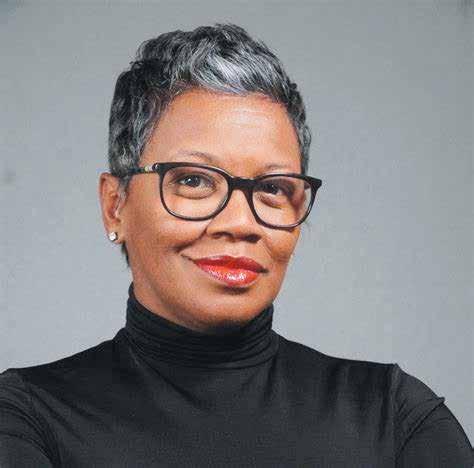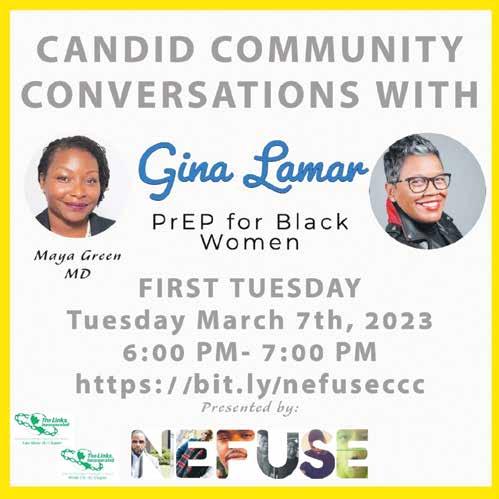
3 minute read
Gina Lamar Evans wants Black Women to Protect Themselves Against HIV
Danielle Sanders CNW Managing Editor
Gina Lamar Evans, MPH, is the owner of NEFUSE and creator of Monday Night Mingle. She works to normalize the discussion of sexual health in the Black Community as well as provide case management services for those living with HIV. During Women’s History Month in March, she will host community conversations for Black women on the subject of PrEP and HIV prevention. Lamar says it is imperative Black women know how to keep themselves safe and healthy. “We’ve got to get our health together so we can fight for our families and our communities.”
Advertisement
PrEP is recommended, PrEP coverage was about three times as high in 2020 among males (28%) as among females (10%). Cisgender women represented 19% of new HIV diagnoses in 2019, so addressing this imbalance is critical to achieving adequate PrEP coverage to end the HIV epidemic.
According to the CDC, more than 40% of new HIV infections in the United States occur among Black people. Racism, systemic inequities, social and economic marginalization, residential segregation, and other longstanding barriers are key drivers of the disproportionate impact of HIV among Black communities in the U.S. Despite progress in slowing the spread of HIV, the virus continues to disproportionately affect Black people with Black Gay and Bisexual men and Black heterosexual women being affected most.
For Black Women, 91% of new HIV infections were attributed to heterosexual contact while the HIV infection rate among Black women was the highest compared to women of all other races and ethnicities. Additionally, the CDC study found that Black Transgender women accounted for 62% of HIV infections among transgender women with HIV living in seven major U.S. cities. In spite of these alarming numbers, the most affected groups are also the least likely to receive equitable treatment and prevention options.
Pre-exposure prophylaxis also known as PrEP is an HIV prevention medication initiated before and continued throughout periods of potential exposure to HIV. It is safe and highly effective when taken as prescribed. According to data from the CDC, Black, and Hispanic/Latino people account for the majority of people for whom PrEP is recommended but have the lowest rates of PrEP use among all racial/ethnic groups. Preliminary data shows only 9% (42,372) of the nearly 469,000 Black people who could benefit from PrEP received a prescription in 2020.
Young people ages 1624 are the least likely to be using PrEP. Preliminary CDC data show only about 16% (38,454) of this population for whom PrEP is recommended were prescribed it in 2020, compared to the approximate 27% (119,246) and 30% (72,146) of people aged 25-34 and 35-44, respectively.
PrEP coverage is also unevenly distributed among people based on sex. Among people for whom
Lamar says she decided to launch this discussion this year because women were completely excluded from the medical studies and research involving HIV prevention drugs such as PrEP. “I wanted to do something to bridge the gap between black women and health care. We are dying at higher rates, getting diagnosed with diseases at higher rates.”, Lamar says.
PrEP is for people who are more likely to get HIV from sex or drug use that involves needles. There are different kinds of PrEP medications. Emtricitabine/ tenofovir (Truvada) was approved for people who have receptive vaginal sex, which includes women, transgender men, and some nonbinary people. Another option for women is Apretude (CAB-LA, or long-acting cabotegravir) which was approved for PrEP for both men and women in 2021. Emtricitabine/tenofovir is a pill you take every day. The virus-fighting drugs help stop HIV from setting up an infection and spreading in your body.
PrEP is recommended for women who’ve had anal or vaginal sex in the past 6 months and have:
• A sexual partner with HIV
• Been diagnosed with a sexually transmitted infection (STI) in the past 6 months.
• A sexual partner who has risky sex with other people
• A partner who uses injectable drugs
• Used post-exposure prophylaxis (PEP) more than once.
It’s also recommended if you don’t always use a condom. You might also benefit from PrEP if you use injectable drugs and you:
• Have an injection partner with HIV.
• Share needles, syringes, or other tools for drug use. Lamar says the key to HIV prevention is knowledge and education but also agrees that the messaging surrounding HIV prevention drugs like PrEP have to be targeted to reach the demographics the virus affects most. “I wanted to be more intentional about preparing black women to unite and ignite and to do more for ourselves”, said Lamar.
Dr. Maya Green, Chief Medical Officer, for Howard Brown Health will also join Lamar for some of the community conversation events. “Candid Community Conversations” will discuss PrEP, relationships, and how black women can protect themselves from HIV.








